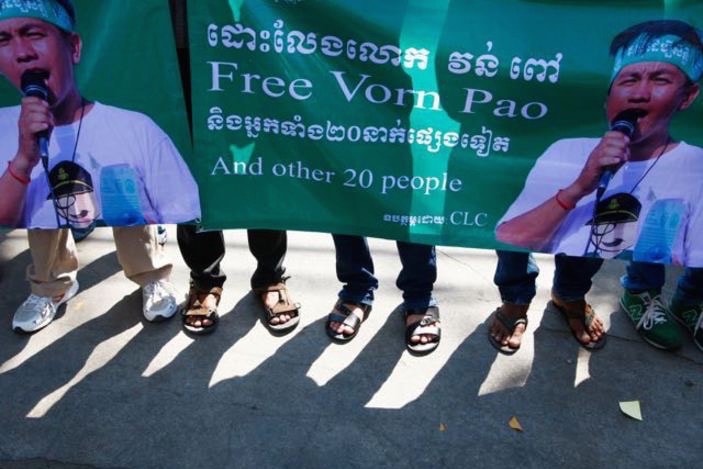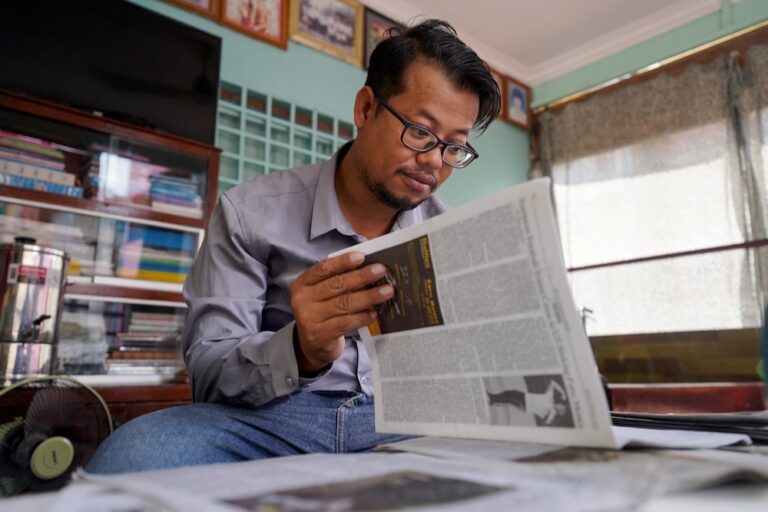Vorn Pao is a workers' rights activist whose advocacy for Cambodia's low paid workers has been met with assaults, imprisonment and the threat of being returned to jail.
In February 2014 while he was in prison, Cambodian activist Vorn Pao wrote: “For me, even though my body is being detained in prison, my soul, my ideals, my willingness and my consciousness is not being detained.”
On 29 December 2013, Vorn Pao, president of the Independent Democracy of Informal Economy Association (IDEA), brought workers and activists together to protest against the minimum wage, gathering outside the Yakjin garment factory in Phnom Penh. This was one of a number of similar labour actions that had been going on for some weeks. The US$80 a month minimum wage set by the government is well below the real cost of living, said the protestors, who demanded that the figure be doubled to US$160. As time wore on, the unrest grew violent, with protestors throwing explosives and stones, setting cars alight, and some reportedly carrying knives. The police response was harsh. Five protestors were killed as police fired AK-47s into a group of protestors who had blocked a road with burning tires.
Then, on 2 January 2014 Military Special Forces were sent in to quell the demonstration outside Yakjin which they did with brutality, beating protestors. Vorn Pao himself was set upon with batons, suffering severe injuries to his head and spine as he was dragged to the police station. The next day, he and 22 other activists who had been involved in the Yakjin and other protests – becoming collectively known as the “23” – were charged, and then taken to a prison in Kampong Cham, some 125 km from the capital. For several days their whereabouts were unknown. The prisoners later spoke of being abused, humiliated and living in overcrowded, dire conditions that Vorn Pao described as “not for human beings”.
Yet when Vorn Pao and others in the group of 23 came to trial in April 2014, it was they who were accused of violence. The Cambodian Center for Human Rights (CCHR) has pointed to critical flaws in the trial, including the court’s refusal to allow the showing of a video apparently showing Vorn Pao calling for protestors to step away from the violence. The prosecution video evidence of the protests did not show images of the defendants taking part in the violent attacks, and some statements were said to have been obtained under duress. CCHR added that the court was “neither impartial, nor independent” with prosecutors and judges repeatedly referring to the defendants as “illegal groups”, “anarchists” and “gangsters”.
Despite these concerns, the 23 were given suspended prison sentences ranging from one to four and a half years. Vorn Pao, accused of instigating the violence, received a sentence of four years and one month, plus a fine of 8 million riel – around US$2,000. Although freed when the trial closed in May 2014, they live under constant threat of being returned to prison to serve the rest of their sentences if convicted of another offence. Vorn Pao is appealing the conviction.
His life has been one of continual action against social injustice. Working for a garment factory in the late 1990s gave Vorn Pao first hand experience of the poor working conditions that are rife in Cambodia. This led him to become a union leader, organising protests and strikes, and that in turn led to his dismissal. He went on to work as a taxi driver, and set up another union for taxi and tuk tuk drivers in Phnom Penh, which evolved into IDEA. IDEA has expanded into other cities, and represents others working in the informal economy such as street vendors and restaurant workers. It has also joined forces with other campaigners in Cambodia, including those fighting for land rights and democratic reform.
The fight continues. In June 2015 IDEA was at the forefront of actions condemning a proposed new NGO law that was passed despite national and international outcry. The International Commission of Jurists describes the law as “poised to hobble the work of civil society”. Then, in early January 2016, Vorn Pao was threatened with further legal action for organising a memorial event commemorating those who died in the January 2014 protests. The current government antipathy towards civil society organisations is set to make Vorn Pao’s work even more challenging.
“I’ll keep protesting. I’ll teach a new generation what I’ve experienced,” Vorn Pao was quoted as saying in Voice of America in January 2015.



